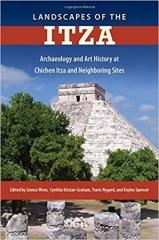Chichen Itza, the legendary capital and trading hub of the late Maya civilization, continues to fascinate visitors and researchers with unanswered questions about its people, rulers, rituals, and politics. Addressing many of these current debates, Landscapes of the Itza asks when the city's construction was completed, what the purposes of its famous pyramid and other buildings were, how the city's influence was felt in smaller neighboring settlements, and whether the city maintained strict territorial borders. Special attention is given to the site's visual culture, including its architecture, ceramics, sculptures, and murals. This volume is a much-needed update on recent archaeological and art historical work being done at Chichen Itza, offering new ways of understanding the site and its role in the Yucatan landscape.

(0 Comentarios)